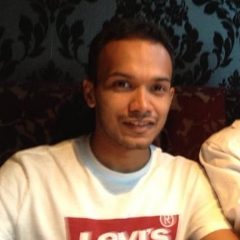Kerala’s voracious chat appetite gets a raunchy match in Clubhouse

Mail This Article
Kerala’s voracious appetite for public discussions has finally met its match.
From long, threadbare discussions on the unique place ‘Porotta’ holds in our socio-cultural setting, to an ensemble cast narrating a play, Clubhouse is the state’s latest fad.
This invite-only app, now available on Google Playstore a year after its launch on iOS devices, is drawing Malayalis by hordes.
Their innate urge to politicise any topic or indulge in gossip is getting a voice. And a public platform, hitherto confined to TV channel discussions.
Having overwhelmed tea shops, office canteens and street corners in the past decades, the wide adoption of Clubhouse is only a natural progression of these talks into the digital sphere.

What is Clubhouse?
Essentially, Clubhouse is like any other podcast, but what makes it special is the layer of interactivity.
Users can not only listen in on conversations or interviews, they can also partake in them.
It is this level of interactivity, not to mention our craving for exclusivity, that has propelled Clubhouse to gain one of the largest downloads in the market.
According to data analytics firm Sensor Tower, Clubhouse has neared 4 million installs worldwide. In India, it has over 1.3 lakh users since its release on May 21.
Clubhouse was developed by Rohan Seth and Paul Davison.
How can you get into Clubhouse?
While you can download the app and create an account, you can only sign in once you are invited to join by an existing member.
Once you've bypassed this minor obstacle, a plethora of topics lie in wait for you to rile against or endorse – like: is it okay for egg puffs to have just half an egg?
The more interests you key in, the more conversation rooms and individuals are recommended by the app.
The USP
Unlike most social media platforms where your chats stay on for eternity, Clubhouse's audio chats disappear after the conversation room is closed.
Several rooms can be created for a variety of purposes, including informal chats with close friends, planning a party, meeting strangers, and engaging in debates and discussions.
Every room is supervised by a moderator so the content is filtered, unlike any other media platform.
Privacy matters
There's no option to send a private message to someone on Clubhouse. You could build a private room to facilitate this, but that's only a workaround.
In fact, the only true way you can send a private message on Clubhouse is by heading over to a user's profile and navigating to their other social media platforms listed there - usually Twitter or Instagram – provided they have enabled that option here.
Besides, all the conversations are end-to-end encrypted and cannot be recorded, making the app secure for its users amid rising concerns of privacy.

Celeb attraction
Clubhouse caught global attention after Tesla founder Elon Musk hosted an audio-chat with US-based trading and investing app Robinhood's CEO Vlad Tenev in February this year.
Celebs from all walks of life including eminent writers and filmmakers are also making their presence felt in these discussion rooms, which is also acting as a magnet for the discussion-prone Malayali.
Media organisations have also started creating chat rooms, further drawing hordes of Keralites to endless banter and serious debates.
Political collectives are also making a splash in Clubhouse to exploit its potential reach.
Evolution of voice chat
Voice chats are nothing new. WhatsApp launched voice messages in August 2013 as an added feature to augment its already-popular text-messaging service.
The idea then was to “make keeping in touch easier”. “We know there's no substitute for hearing the sound of a friend or family member's voice,” WhatsApp's blog read.
And it worked, though not as well as the company hoped.
It was after all still the age of “good morning” GIFs, random video share and elaborate group chats.
Things changed in 2018 when Facebook, the parent company of WhatsApp, decided to adopt the voice message feature.
Perhaps, the company realized then that voice messages were in better sync with Gen-Z audiences, who cannot be bothered to type.
Later, many more people learned that it was just easier to do voice messages than type, especially when giving directions.
A 3-minute long audio message directing someone to your residence in nobody-knows-where Noida saves all that needless calls and running around in circles.
That's not all, voice messages gave an impression of intimacy in an otherwise hostile world of social networks.
The only reason Clubhouse was able to dethrone WhatsApp in audio-chats despite the latter having enabled several millions to adopt this audio-chat format was the simplicity it delivered.
Clubhouse interactions: A shorthand
• Muting yourself is an unmistakable sign that you finished talking.
• You can applaud someone by tapping the mute/unmute button repeatedly.
• Raising your hand is a sign that you want to be involved in the discussion.
• Stage: If you raise your hand, moderators can invite you to the 'Stage' - this is where speakers assemble.
• Leaving the Stage is a sign that you currently cannot speak.
• Unmuting yourself while on Stage means you want to say something immediately.
• Usually, a speaker talks for 1 minute.


